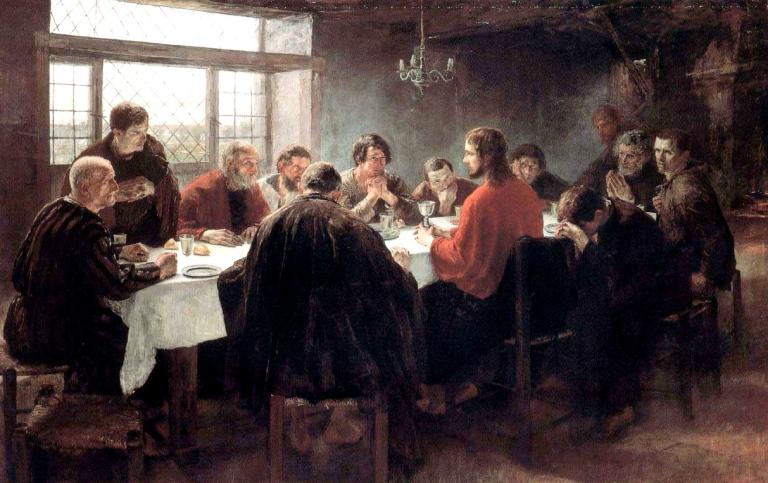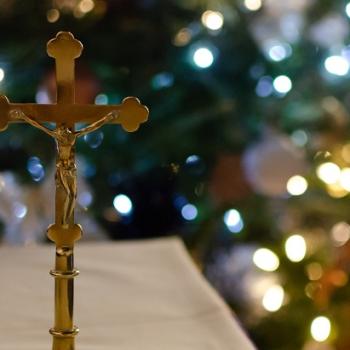
by Peter J. Leithart
At the center of the Sermon on the Mount, Jesus teaches about three duties of Jewish piety – alms, prayer, and fasting. Regarding the last, He says, “when you fast, do not put on a gloomy face as the hypocrites, for they render their faces unrecognizable in order to be seen fasting by men. . . . But you, when you fast, anoint your head, and wash your face, so that you may not be seen fasting by men, but by your Father who is in secret” (Matthew 6:16-18).
Many believe that Jesus focuses on the internal demands of the law. Scribes and Pharisees are concerned with action; Jesus is concerned with attitude. There’s something to that. Jesus sets two motivations in opposition to each other: Some do righteousness to be seen by men, but disciples should do it before the Father.
But Jesus doesn’t go all Kantian; He doesn’t say our actions don’t matter as long as our hearts are in the right place. He commands a different set of practices concerning alms, prayer and fasting. He doesn’t say, “Change your attitude.” He says, “Do these things, but do them differently.”
His instructions are pretty specific. David fasted and prayed for his son to be saved, but when the boy died he rose from the dust, washed and anointed himself, changed his clothes, worshiped and ate. Anointing and washing marked the end of the fast. Jesus blurs the boundaries between the fast and its end; he pushes fast and feast together into a single act. Paradoxically enough, Jesus tells us to fast with all the accouterments of feasting.
What are we to do with that?
Perhaps this is Jesus’ clever way to tell us that we don’t have to fast at all: When the Bridegroom shows up, can the friends of the Bridegroom continue to mourn as if He’s not there? That’s overly subtle, and besides, it’s not what His first disciples did. In several places in Acts, we see disciples devoting themselves to prayer and submitting to the voluntary death of fasting, in hope that the Lord will raise them (Acts 13:2-3; 14:23; cf. 27:9). Christians are still to observe fasts as we devote ourselves to prayer.
Or, we might spiritualize: Jesus wants us to dress for a feast when we are fasting, and dress for a feast when we are feasting, and dress for a feast for every occasion in between. Jesus is our festal clothing, His Spirit the oil that anoints our head, baptism the water that cleanses our faces. Feasting or fasting, we have this anointing and this washing. Fasting or feasting, we wear Jesus, our festal robe.
That’s right, but there’s more to say, because refraining from food isn’t the only kind of fast the Bible demands. According to Isaiah 58, to fast is to break the bonds of injustice, to liberate the oppressed, to feed the hungry and clothe the naked, to open our hands to the orphan and widow, not to hide from our own flesh. Paul echoes the prophet by instructing us to fast from the leaven of malice and wickedness as we keep the Christian Passover. That is the fast the Lord chooses.
Isaiah isn’t saying, of course, that we take a temporary break from oppression and violence, that we give up fraud like some people give up fudge. The Lord’s fast is a way of life, the way of Jesus. Within that way, there is plenty of space for penitential seasons, for deliberate seasons of fasting, for times of self-examination and re-commitment to the continuous fast of God. Refraining from food and drink is beneficial so long as it has that fast as its aim.
With Isaiah in mind, we can see how Jesus can talk about feast-fasting or fast-feasting. Christians have a feast that models the true, Isaianic fast: the Eucharist. At the Lord’s table, we receive Christ in bread and wine, and share it with one another. At the table, we are at peace. At the table, we are table companions with people from every tribe and tongue and nation and people, in communion with weak sinners just like us. At the table, we dare not hide ourselves from our own flesh. The Eucharist is a festive liturgical expression of the Lord’s fast.
If the hospitality we practice at the Eucharistic table doesn’t flow out into life, then what we do at church is not the Lord’s Supper. If we share bread in church but hoard it at home; if we receive the broken as brothers at the table but shut them out of our gated neighborhoods; if we make our liturgical offering but spend the week preying on the helpless – then our Eucharist has become a table of demons.
Yahweh has choice words for such Christians and such churches: “I hate your new moon festivals and your appointed feasts, they have become a burden to me. . . when you spread out your hands, I will hide My eyes . . . I will not listen. Your hands are full of blood” (Isaiah 1:14-15).
We must keep the feast all the time in every place, as Eucharist expands to indwell our entire lives. And that is just to say: We are to keep the Lord’s fast continuously, spending every day with oil head and clean faces, joyously breaking yokes of oppressing and opening prison doors and inviting the hungry to share the Lord’s table with us.

Peter Leithart is President of the Theopolis Institute in Birmingham, Alabama. To learn more about Theopolis, sign up for the e-newsletter In Medias Res and receive an excerpt of Leithart’s book, Gratitude: An Intellectual History.












